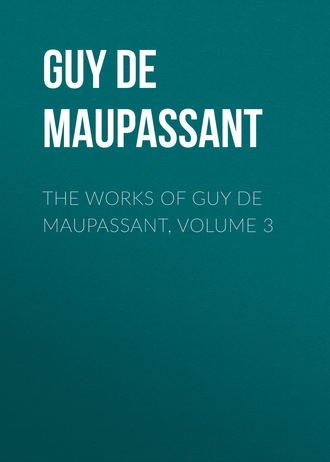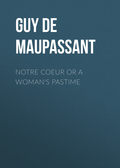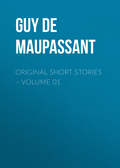
Ги де Мопассан
The Works of Guy de Maupassant, Volume 3
THE DOUBLE PINS
"Ah; my-dear fellow, what jades women are!"
"What makes you say that?"
"Because they have played me an abominable trick."
"You?"
"Yes, me."
"Women, or a woman?"
"Two women."
"Two women at once?"
"Yes."
"What was the trick?"
The two young men were sitting outside a café on the Boulevards, and drinking liquors mixed with water, those aperients which look like infusions of all the shades in a box of water-colors. They were nearly the same age, twenty-five to thirty. One was dark and the other fair, and they had the same semi-elegant look of stock-jobbers, of men who go to the Stock Exchange, and into drawing-rooms, who are to be seen everywhere, who live everywhere, and love everywhere. The dark one continued.
"I have told you of my connection with that little woman, a tradesman's wife, whom I met on the beach at Dieppe?"
"Yes."
"My dear fellow, you know what it is. I had a mistress in Paris, whom I loved dearly; an old friend, a good friend, and it has grown into a habit, in fact, and I value it very much."
"Your habit."
"Yes, my habit, and hers also. She is married to an excellent man, whom I also value very much, a very cordial fellow. A capital companion! I may say, I think that my life is bound up with that house."
"Well?"
"Well! they could not manage to leave Paris, and I found myself a widower at Dieppe."
"Why did you go to Dieppe?"
"For change of air. One cannot remain on the Boulevards the whole time."
"And then?"
"Then I met the little woman I mentioned to you on the beach there."
"The wife of that head of the public office?"
"Yes; she was dreadfully dull; her husband only came every Sunday, and he is horrible! I understand her perfectly, and we laughed and danced together."
"And the rest?"
"Yes, but that came later. However, we met, we liked each other. I told her I liked her, and she made me repeat it, so that she might understand it better, and she put no obstacles in my way."
"Did you love her?"
"Yes, a little; she is very nice."
"And what about the other?"
"The other was in Paris! Well, for six weeks it was very pleasant, and wre returned here on the best of terms. Do you know how to break with a woman, when that woman has not wronged you in any way?"
"Yes, perfectly well."
"How do you manage it?"
"I give her up."
"How do you do it?"
"I do not see her any longer."
"But supposing she comes to you?"
"I am … not at home."
"And if she comes again?"
"I say I am not well."
"If she looks after you?"
"I play her some dirty trick."
"And if she puts up with it?"
"I write to her husband anonymous letters, so that he may look after her on the days that I expect her."
"That is serious! I cannot resist, and do not know how to bring about a rupture, and so I have a collection of mistresses. There are some whom I do not see more than once a year, others every ten months, others on those days when they want to dine at a restaurant, those whom I have put at regular intervals do not worry me, but I often have great difficulty with the fresh ones, so as to keep them at proper intervals."
"And then…"
"And then … Then, this little woman was all fire and flame, without any fault of mine, as I told you! As her husband spends all the whole day at his office, she began to come to me unexpectedly, and twice she nearly met my regular one on, the stairs."
"The devil!"
"Yes; so I gave each of them her days, regular days, to avoid confusion; Saturday and Monday for the old one, Tuesday, Friday and Sunday for the new one."
"Why did you show her the preference?"
"Ah! My dear friend, she is younger."
"The devil!"
"Yes; so I gave each of them her days, regular days, to avoid confusion; Saturday and Monday for the old one, Tuesday, Friday and Sunday for the new one."
"Why did you show her the preference?"
"Ah! My dear friend, she is younger."
"So that only gave you two days to yourself in a week."
"That is enough for one."
"Allow me to compliment you on that."
"Well, just fancy that the most ridiculous and most annoying thing in the world happened to me. For four months everything had been going on perfectly; I felt perfectly safe, and I was really very happy, when suddenly, last Monday, the crash came.
"I was expecting my regular one at the usual time, a quarter past one, and was smoking a good cigar, and dreaming, very well satisfied with myself, when I suddenly saw that it was past the time, at which I was much surprised, for she is very punctual, but I thought that something might have accidentally delayed her. However, half-an-hour passed, then an hour, an hour and a half, and then I knew that something must have detained her; a sick headache, perhaps, or some annoying visitor. That sort of waiting is very vexatious, that … useless waiting … very annoying and enervating. At last, I made up my mind to go out, and not knowing what to do, I went to her and found her reading a novel."
"Well!" I said to her. And she replied quite calmly:
"My dear I could not come; I was hindered."
"How?"
"My … something else."
"What was it?
"A very annoying visit."
"I saw that she would not tell me the true reason, and as she was very calm, I did not trouble myself any more about it, and hoped to make up for lost time with the other, the next day, and on the Tuesday, I was very … very excited, and amorous in expectation of the public official's little wife, and I was surprised that she had not come before the appointed time, and I looked at the clock every moment, and watched the hands impatiently, but the quarter past, then the half-hour, then two o'clock. I could not sit still any longer, and walked up and down very soon in great strides, putting my face against the window, and my ears to the door, to listen whether she was not coming upstairs."
"Half-past two, three o'clock! I seized my hat, and rushed to her house. She was reading a novel my dear fellow! 'Well!' I said, anxiously, and she replied as calmly as usual: 'I was hindered, and could not come.'
"'By what?'
"'An annoying visit.'
"Of course, I immediately thought that they both knew everything, but she seemed so calm and quiet, that I set aside my suspicions, and thought it was only some strange coincidence, as I could not believe in such dissimulation on her part, and so, after half-an-hour's friendly talk, which was, however, interrupted a dozen times by her little girl coming in and out of the room. I went away, very much annoyed. Just imagine the next day…"
"The same thing happened?"
"Yes, and the next also. And that went on for three weeks without any explanation, without anything explaining that strange conduct to me, the secret of which I suspected, however."
"They knew everything?"
"I should think so, by George. But how? Ah! I had a great deal of anxiety before I found it out."
"How did you manage it at last?"
"From their letters, for on the same day they both gave me their dismissal in identical terms."
"Well?"
"This is how it was… You know that women always have an array of pins about them. I know hairpins, I doubt them, and look after them, but the others are much more treacherous; those confounded little black-headed pins which look all alike to us, great fools that we are, but which they can distinguish, just as we can distinguish a horse from a dog.
"Well, it appears that one day my minister's little wife left one of those tell-tale instruments pinned to the paper, close to my looking-glass. My usual one had immediately seen this little black speck, no bigger than a flea, and had taken it out without saying a word, and then had left one of her pins, which was also black, but of a different pattern, in the same place.
"The next day, the minister's wife wished to recover her property, and immediately recognized the substitution. Then her suspicions were aroused, and she put in two and crossed them, and my original one replied to this telegraphic signal by three black pellets, one on the top of the other, and as soon as this method had begun, they continued to communicate with one another, without saying a word, only to spy on each other. Then it appears that the regular one, being bolder, wrapped a tiny piece of paper round the little wire point, and wrote upon it: C. D., Poste Restante, Boulevards, Malherbes.
"Then they wrote to each other. You understand that was not everything that passed between them. They set to work with precaution, with a thousand stratagems, with all the prudence that is necessary in such cases, but the regular one did a bold stroke, and made an appointment with the other. I do not know what they said to each other; all that I know is, that I had to pay the costs of their interview. There you have it all!"
"Is that all?"
"Yes."
"And you do not see them any more?"
"I beg your pardon. I see them as friends, for we have not quarreled altogether."
"And have they met again?"
"Yes, my dear fellow, they have become intimate friends."
"And has not that given you an idea?"
"No, what idea?"
"You great booby! The idea of making them put back the pins where they found them."
UNDER THE YOKE
As he was a man of quiet and regular habits, and of a simple and affectionate disposition, and had nothing to disturb the even tenor of his life, Monsieur de Loubancourt suffered more than most men do from his widowerhood. He regretted his lost happiness, was angry with fate, which separated united couples so brutally, and which made choice of a tranquil existence, whose sleepy quietude had not hitherto been troubled by any cares or chimeras, in order to rob it of its happiness.
Had he been younger, he might, perhaps, have been tempted to form a new line, to fill up the vacant place, and to marry again. But when a man is nearly sixty, such ideas make people laugh, for they have something ridiculous and insane about them; and so he dragged on his dull and weary existence, escaped from all those familiar objects which constantly recalled the past to him, and went from hotel to hotel without taking an interest in anything, without becoming intimate with anyone, even temporarily; inconsolable, silent, almost enigmatical, and looking funereal in his eternal black clothes.
He was generally alone, though on rare occasions he was accompanied by his only son, who used to yawn by stealth, and who seemed to be mentally counting the hours, as if he were performing some hateful, enforced duty in spite of himself.
Two years of this crystallization went past, and one was as monotonous, and as void of incident, as the other.
One evening, however, in a boarding-house at Cannes, where he was staying on his wanderings, there was a young woman dressed in mourning, among the new arrivals, who sat next to him at dinner. She had a sad, pale face, that told of suffering, a beautiful figure, and large, blue eyes with deep rings round them, but which, nevertheless, looked like the first star which shines in the twilight.
All remarked her, although he usually took no notice of women, no matter whatever they were, ugly or pretty; he looked at her and listened to her. He felt less lonely by her side, though he did not know why. He trembled with instinctive and confused happiness, just as if in some distant country he had found some female friend or relative, who at last would understand him, tell him some news, and talk to him in his dear native language about everything that a man leaves behind him when he exiles himself from home.
What strange affinity had thrown them together thus? What secret forces had brought their grief in contact? What made him so sanguine and so calm, and incited him to take her suddenly into his confidences, and urged him on to resistless curiosity?
She was an experienced traveler, who had no illusions, and was in search of adventures; one of those women who frequently change their name, and who, as they have made up their minds to swindle if luck is not on their side, act a continual part, an adventuress, who could put on every accent; who for the sake of her course, transformed herself into a Slav, or into an American, or simply into a provincial; who was ready to take part in any comedy in order to make money, and not to be obliged to waste her strength and her brains on fruitless struggles or on wretched expedients. Thus she immediately guessed the state of this melancholy sexagenarian's mind, and the illusions which attracted him to her, and scented the spoils which offered themselves to her cupidity of their own accord, and divined under what guise she ought to show herself, to make herself accepted and loved.
She initiated him into depths of grief which were unknown to him, by phrases which were cut short by sighs, by fragments of her story, which she finished by a disgusted shrug of the shoulders, and a heartrending smile, and by insensibly exciting his feelings. In a word, she triumphed over the last remaining doubts, which might still have mingled with the affectionate pity with which that poor, solitary heart, which, so full of bitterness, overflowed.
And so, for the first time since he had become a widower, the old man confided in another person, poured out his old heart into that soul which seemed to be so like his own, which seemed to offer him a refuge where he could be cheered up, and where the wounds of his heart could be healed, and he longed to throw himself into those sisterly arms, to dry his tears and to exercise his grief there.
Monsieur de Loubancourt, who had married at twenty-five, as much from love as from judgment, had lived quietly and peacefully in the country, much more than in Paris. He was ignorant of the female wiles of temptations, offered to creatures like Wanda Pulska, who was made up of lies, and only cared for pleasure, a virgin soil on which any seed will grow.
She attached herself to him, became his shadow, and by degrees, part of his life. She showed herself to be a charitable woman who devoted herself to an unhappy man, who endeavored to console him, and who, in spite of her youth, was willing to be the inseparable companion of the old man in his slow, daily walks. She never appeared to tire of his anecdotes and reminiscences, and she played cards with him. She waited on him carefully when he was confined to his bed, appeared to have no sex, and transformed herself; and though she handled him skillfully, she seemed ingenuous and ignorant of evil. She acted like an innocent young girl, who had just been confirmed; but for all that, she chose dangerous hours and certain spots in which to be sentimental and to ask questions which agitated and disconcerted him, and abandoned her slender fingers to his feverish hands, which pressed and held them in a tender clasp.
And then, there were wild declarations of love, prayers and sobs which frightened her; wild adieux, which were not followed by his departure, but which brought about a touching reconciliation and the first kiss, and then, one night, while they were traveling together, he forced open the door of her bedroom at the hotel, which she had locked, and came in like a mad man. There was the phantom of violence, and the fallacious submission of a woman, who was overcome by so much tenderness, who rebelled no longer, but who accepted the yoke of her master and lover. And then, the conquest of the body after the conquest of the heart, which forged his chain link by link, pleasures which besot and corrupt old men, and dry up their brains, until at last he allowed himself to be induced, almost unconsciously, to make an odious and stupid will.
Informed, perhaps, by anonymous letters, or astonished because his father kept him altogether at a distance from him, and gave no signs of life, Monsieur de Loubancourt's son joined them in Provence. But Wanda Pulska, who had been preparing for that attack for a long time, waited for it fearlessly.
She did not seem disconcerted at that sudden visit, but was very charming and affable towards the new comer, reassured him by her careless airs of a girl, who took life as it came, and who was suffering from the consequences of a fault, and did not trouble her head about the future.
He envied his father, and grudged him such a treasure. Although he had come to combat her dangerous influence, and to treat the woman, who had assumed the place of death, and who governed her lover as his sovereign mistress, as an enemy, he shrunk from his task, panted with desire, lost his head, and thought of nothing but treason and of an odious partnership.
She managed him even more easily than she had managed Monsieur de Loubancourt, molded him just as she chose; made him her tool, without even giving him the tips of her fingers, or granting him the slightest favor, induced him to be so imprudent, that the old man grew jealous, watched them, discovered the intrigue, and found mad letters in which his son was angry, begged, threatened and implored.
One evening, when she knew that her lover had come in, and was hiding in a dark cupboard in order to watch them, Wanda happened to be alone in the drawing-room, which was full of light, of beautiful flowers, with this young fellow, five-and-twenty. He threw himself at her feet and declared his love, and besought her to run away with him, and when she tried to bring him to reason and repulsed him, and told him in a loud and very distinct voice, how she loved Monsieur de Loubancourt, he seized her wrists with brutal violence, and maddened with passion and stammering words of love and lust, he pushed her towards one of the couches.
"Let me go," she said, "let me go immediately… You are a brute to take advantage of a woman like that… Please let me go, or I shall call the servants to my assistance."
The next moment, the old man, terrible in his rage, rushed out of his hiding place with clenched fists and a slobbering mouth, threw himself on the startled son, and pointing to the door with a superb gesture, he said:
"You are a dirty scoundrel, sir. Get out of my house immediately, and never let me see you again!"
The comedy was over. Grateful for such fidelity and real affection, Monsieur de Loubancourt married Wanda Pulska, whose name appeared on the civil register – which was a detail of no importance to a man who was in love – as Frida Krubstein; she came from Saxony, and had been a servant at an inn. Then he disinherited his son, as far as he could.17
And now that she is a respectable and respected widow, Madame de Loubancourt is received everywhere by society in those places of winter resort where people's by-gone history is so rarely gone into, and where women bear a name, who are pretty, and who can waltz – like the Germans can, are always well received.
THE READ ONE AND THE OTHER
"Well, really," Chasseval said, standing with his back to the fire, "could any of those respectable shop-keepers and wine growers have possibly believed that that pretty little Parisian woman, with her soft innocent eyes, like those of a Madonna, with such smiling lips and golden hair, and who always dressed so simple, was their candidate's mistress?"
She was a wonderful help to him, and accompanied him even to the most outlying farms; went to the meetings in the small village cafés and had a pleasant and suitable word for every one, and did not recoil at a glass of mulled wine or a grip of the hand, and was always ready to join in farandole.18 She seemed to be so in love with Eliénne Rulhiére, to trust him so entirely, to be so proud of forming half of his life, and of belonging to him, gave him such looks full of pleasure and of hope, and listened to all he said so intently, that voters who might have hesitated, allowed themselves by degrees to be talked over and persuaded; and promised their votes to the young doctor, whose name they never heard mentioned in the district before.
That electoral campaign had been like a truant's escapade for Jane Dardenne; it was a delightful and unexpected holiday, and as she was an actress at heart, she played her part seriously, and threw herself into her character, and enjoyed herself more than she ever enjoyed herself in her most adventurous outings.
And then there came in the pleasure of being taken for a woman of the world, of being flattered, respected and envied, and of getting out of the usual groove for a time, and also the dream that this journey of a few weeks would have the sequence, that her lover would not separate from her on their return, but would sacrifice the woman whom he no longer loved, and whom he ironically used to call his Cinderella, to her.
At night, when they had laid aside all pretense, and when they were alone in their room in the hotel, she coaxed him and flattered him, spurred his ambition on, threw her quivering arms around him, and amidst her kisses, whispered those words to him, which make a man proud and warm his heart, and give him strength, like a stout dram of alcohol.
The two between them captured the district, and won the election easily, and in spite of his youth, Eliénne Rulhiére was chosen by a majority of five thousand. Then, of course, there were more fetes and banquets, at which Jane was present, and where she was received with enthusiastic shouts; there were fireworks, when she was obliged to set light to the first rocket, and balls at which she astonished those worthy people by her affability. And when they left, three little girls dressed in white, as if they were going to be confirmed, came onto the platform and recited some complimentary verses to her while the band played the Marseillaise, the women waved their pocket-handkerchiefs, and the men their hats, and leaning out of the carriage window, looking charming in her traveling costume, with a smile on her lips, and with moist eyes, as was fitting at such a pathetic leave-taking, actress as she was, with a sudden and childlike gesture, she blew kisses to them from the tips of her fingers, and said:
"Good-bye, my friends, good-bye, only for the present; I shall never forget you!"
The deputy, who was also very effusive, had invited his principal supporters to come and see him in Paris as there were plenty of excursion trains. They all took him at his word, and Rulhière was obliged to invite them all to dinner.
In order to avoid any possible mishaps, he gave his wife a foretaste of their guests. He told her that they were rather noisy, talkative, and unpolished, and that they would, no doubt, astonish her by their manners and their accent, but that, as they had great influence, and were excellent men, they deserved a good reception. It was a very useful precaution, for when they came into the drawing-room in their new clothes, expanding with pleasure, and with their hair pomatumed as if they had been going to a country wedding, they felt inclined to fall down before the new Madame Rulhière to whom the deputy introduced them, and who seemed to be perfectly at home there.
At first they were embarrassed, felt uncomfortable and out of place, did not know what to say, and had to seek their words; they buttoned and unbuttoned their gloves, answered her questions at random, and racked their brains to discover the solution of the enigma. Captain Mouredus looked at the fire, with the fixed gaze of a somnambulist, Marius Barbaste scratched his fingers mechanically, while the three others, the factory manager, Casemajel, Roquetton, the lawyer, and Dustugue, the hotel proprietor, looked at Rulhière anxiously.
The lawyer was the first to recover himself. He got up from his arm chair laughing heartily, dug the deputy in the ribs with his elbow, and said:
"I understand it all, I understand it; you thought that people do not come to Paris to be bored, eh? Madame is delightful, and I congratulate you, Monsieur."
He gave a wink, and made signs behind his back to his friends, and then the captain had his turn.
"We are not boobies, and that fellow Roquetton is the most knowing of the lot of us… Ah! Monsieur Rulhière, without any exaggeration, you are the cream of good fellows."
And with a flushed face, and expanding his chest, he said sonorously:
"They certainly turn them out very pretty in your part of the country, my little lady!"
Madame Rulhière, who did not know what to say, had gone up to her husband for protection; but she felt much inclined to go to her own room under some pretext or other, in order to escape from her intolerable task. She kept her ground, however, during the whole of dinner, which was a noisy, jovial meal, during which the five electors, with their elbows on the table, and their waistcoats unbuttoned, and half drunk, told coarse stories, and swore like troopers. But as the coffee and the liquors were served in the smoking room, she took leave of her guests in an impatient voice, and went to her own room with the hasty step of an escaped prisoner, who is afraid of being retaken.
The electors sat staring after her with gaping mouths, and Mouredus lit a cigar, and said:
"Just listen to me, Monsieur Rulhiére; it was very kind of you to invite us here, to your little quiet establishment, but to speak to you frankly, I should not, in your place, wrong my lawful wife for such a stuck-up piece of goods as this one is."
"The captain is quite right," Roquetton the notary opined; "Madame Rulhiére, the lawful Madame Rulhiére, is much more amiable, and altogether nicer. You are a scoundrel to deceive her; but when may we hope to see her?"
And with a paternal grimace, he added:
"But do not be uneasy; we will all hold our tongue; it would be too sad if she were to find it out."







